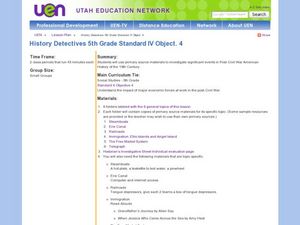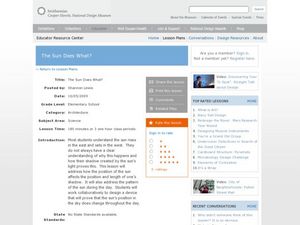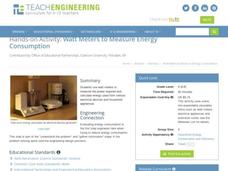Curated OER
Gazing At Cosmic Pinballs
Students explore the world of stars. They see that the color of a star tells how hot or cold it is, that stars come in different sizes. and that stars are moving through space. They draw lines connecting start to star.
Curated OER
Completing the Circuit
Students use a battery, wires, small light bulb and a light bulb holder to learn the difference between an open circuit and a closed circuit, and understand that electric current only occurs in a closed circuit. They describe the...
Curated OER
Meet the Neighbors: Planets Around Nearby Stars
Students explain why a transiting planet causes a periodic dimming in the light from its parent star. They determine the radius of a planet, and its orbital distance, by analyzing data and manipulating equations. Students compare the...
Curated OER
Post-Civil War American History
Fifth graders examine significant events in Post-Civil War America. In this Post-Civil War lesson, 5th graders investigate the important events after the war in 19th century America. They read primary source documents about six topics...
Curated OER
The Sun Does What?
Learners examine why the sun rises in the east and sets in the west. In this sun lesson, students explore the sunset and shadows. Learners prove that the sun's position changes during the day. Students investigate what causes a shadow....
Curated OER
This Is a Stick Up
Students create a sundial and track the movement of the sun throughout the day. Modifications to the lesson plan are provided for both lower and upper elementary students.
Curated OER
Buried Treasure
Students examine the role of micro and macro organisms in the decomposition process. They record their observations and discuss. They also read a book about decomposition.
Curated OER
Cell Observation Exercise
High schoolers take measurements of the distance between the objective and the slide when in focus with each objective. They determine the diameter of the field of view at each power in order to determine the size of the cells being...
Curated OER
Earth Rotation
High schoolers examine the rotation of the Earth as it occurs in the 24 hour cycle. They use models of planets and the globe to make observations of movements made. Students brainstorm prior knowledge and then participate in a...
Curated OER
Resistance
In this resistance worksheet, students read about voltage, current and resistance in order to determine the equation for resistance. They solve fourteen problems for resistance, current or voltage.
Curated OER
Bottle Habitat
In groups of four, learners construct aquatic habitats in pop bottles. They create charts and record data from observations over a four week period. Then they graph their data and write explanations for what they observed.
Curated OER
Living Organisms as Indicators of Pollutants in Fresh Water Ecosystems
Young scholars observe the effects of pollution on living organisms. In this pollution lesson plan, students observe fresh water Hydra and look at their structures and movement. They place samples of pond and lake water on the Hydra and...
Curated OER
PLANT LIFE CYCLES
Student learns about the life cycle of plants by watching a time-lapse video. This activity provides students with further evidence that all living things grow and change as they progress through their life cycle. Student conducts a...
Curated OER
Solar Car Series: During what part of the day can t most Sun power be collected?
Students participate in an outdoor activity in which they make direct but safe observations of the Sun. Students use a solar cell and voltmeter apparatus to collect data on the amount of DC voltage produced by the solar cell during a...
Curated OER
Oklahoma's Berry Best
Ask your learners to complete activities related to Oklahoma's agriculture, berries in particular. The lesson is cross-curricular and has class members investigate an article about berries, write an acrostic poem, and discuss new...
Curated OER
Time Lapse Seed Germination with the QX3 Intel Digital Microscope
Students use the time-lapse feature of the QX3 Intel Digital Microscope
to observe germination of seeds. They use the QX3 Intel Digital microscope to create time lapse video films of seed germination experiments.
Teach Engineering
Watt Meters to Measure Energy Consumption
It used watt amount of energy? This resource investigates the power usage of small household appliances. Using a watt meter, groups measure the actual wattage used by an appliance and then calculate the energy used daily.
World Intellectual Property Organization
Learn from the Past, Create the Future: Inventions and Patents
3D printers, selfie sticks, smart watches. GPS, self-driving cars, YouTube. Imagine life without inventions. Believe it or not, these items were all invented in the last 10 years. Inventions, and the inventors responsible for them, are...
Curated OER
Tools of Modern Astronomy
Learners describe the electromagnetic spectrum and astronomy. In this astronomy lesson students complete an activity, predict what will happen and complete a worksheet.
Curated OER
Water and Ice
Learners explore water. In this water activity, students explore the physical properties and states of water. They observe how water changes states and document what they see.
Curated OER
Stellar Fingerprints: the Spectra of Stars
Students explain how an element can be identified using emission spectra. They relate the emission spectrum of hydrogen to its absorption spectrum and identify hydrogen absorption lines in the spectrum of stars.
Curated OER
Student Power Use
High schoolers calculate the energy usage in their bedroom. In this physics lesson, students compare their energy consumption during school days and weekends. They recommend ways to save energy.
Curated OER
Electric Current
In this electric current worksheet, students review vocabulary words associated with electricity. Students understand how electricity is used in their lives every day. This worksheet has 12 fill in the blank questions.
Curated OER
Energy Flow in Ecosystems
Students, in groups, create a slide show about the ecosystem and answer critical thinking questions based on their research.

























